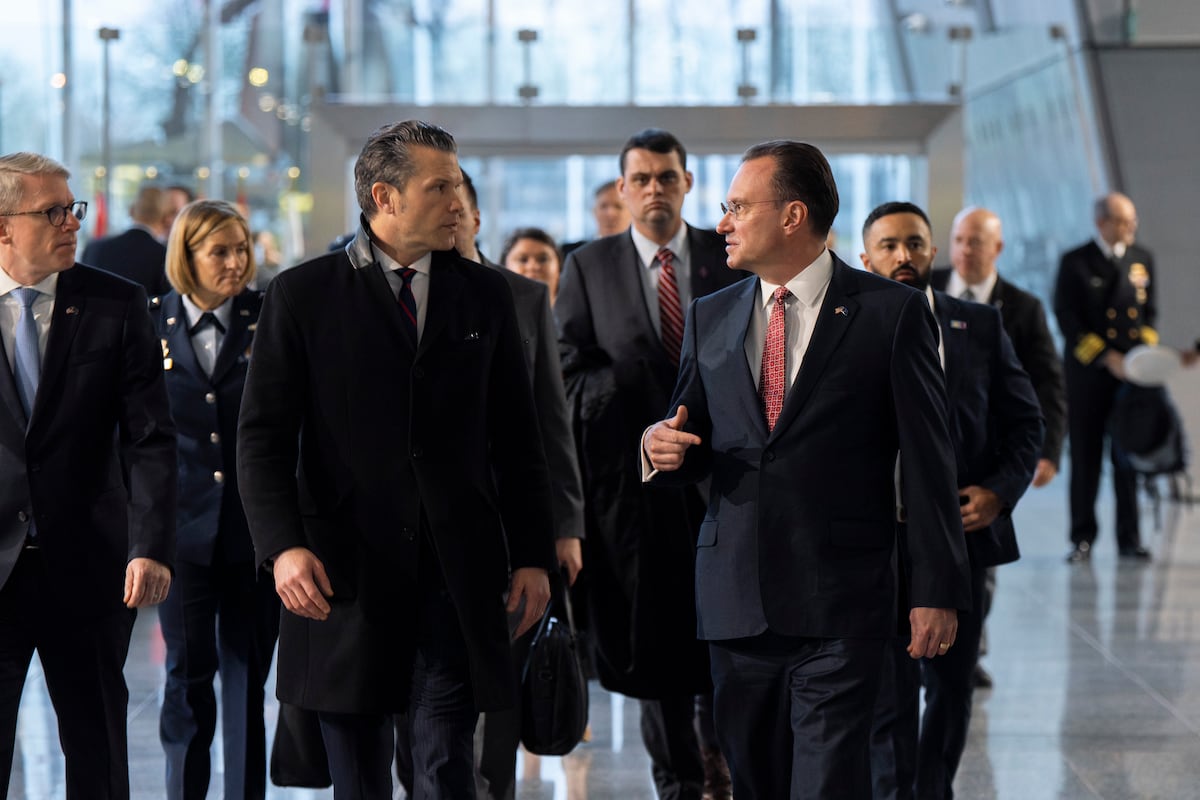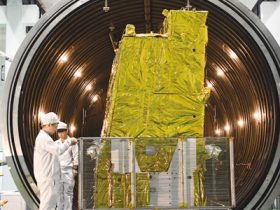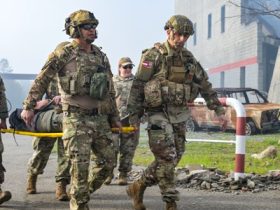Kyiv’s allies across Europe are increasingly anxious after the leaders of Russia and the United States discussed Vladimir Putin’s ongoing Ukraine invasion over the phone on Wednesday.
Opening moves: U.S. President Donald Trump said the two men “agreed to have our respective teams start negotiations immediately” to end Russia’s war in Ukraine. The Kremlin said Putin wants to “eliminate the root causes” of the invasion, which the U.S.-based Institute for the Study of War reminds us “Russian officials have explicitly defined…as NATO’s alleged violation of commitments not to advance eastward in areas near Russia’s border,” suggesting Putin “is not interested in compromising on this demand.”
“We will begin by calling President Zelenskyy, of Ukraine, to inform him of the conversation,” Trump wrote on social media. “I have asked Secretary of State Marco Rubio, Director of the CIA John Ratcliffe, National Security Advisor Michael Waltz, and Ambassador and Special Envoy Steve Witkoff, to lead the negotiations which, I feel strongly, will be successful,” he said.
View from Kyiv: “We, as a sovereign country, simply will not be able to accept any agreements without us,” Ukrainian President Volodymir Zelenskyy said after the Trump-Putin call, according to Reuters. The New York Times reports Zelenskyy’s input may be moot: “With the Trump administration appearing to demand concessions from Ukraine, including mineral rights, in exchange for continued U.S. support, analysts said that Mr. Zelensky has little choice but to go along with American-led talks despite his deep skepticism of Mr. Putin’s readiness to negotiate without imposing onerous conditions.”
Panning out: “Russia’s financial markets soared and the price of Ukraine’s debt rose at the prospect of the first peace talks since the early months of Europe’s deadliest war since World War Two, soon to enter its fourth year,” Reuters reported Thursday.
The view from London: “There can be no negotiation about Ukraine without Ukraine,” British Defence Secretary John Healey said during a meeting of NATO officials in Brussels. “And Ukraine’s voice must be at the heart of any talks,” said Healey.
View from Berlin: “Europe must be involved in the negotiations, and I think that’s very easy to understand” as Europe is ”supposed to play a central or the main role in the peace order” and “will have to live directly” with the result, German Defense Minister Boris Pistorius told reporters, according to the Associated Press.
European Union foreign policy chief Kaja Kallas was particularly concerned over what she said appeared to be appeasement. “We shouldn’t take anything off the table before the negotiations have even started, because it plays to Russia’s court,” she told reporters. “Why are we giving them everything that they want even before the negotiations have been started? It’s appeasement. It has never worked.”
Kallas was talking about Pentagon chief Pete Hegseth, who one day earlier told Ukraine’s allies at a Brussels meeting that Kyiv should probably drop its demand that Russia give back invaded territory in the east and the south.
Hegseth also denied allegations that the U.S. and Russia have begun talks on Ukraine without Zelenskyy or Ukrainian officials.
“There is no betrayal there,” he said on Thursday. “There is a recognition that the whole world and the United States is invested and interested in peace. A negotiated peace.”
By the way: China wants to host Trump-Putin talks on the future of Ukraine, and the plans for that event do not include Zelenskyy, the Wall Street Journal reports. For what it’s worth, “The offer, however, is being met with skepticism in the U.S. and Europe, given deep concerns over the increasingly close ties between Beijing and Moscow.”
Trump said Saudi Arabia may host those talks with Putin. “We expect that he’ll come here, and I’ll go there and we’re going to meet also probably in Saudi Arabia the first time,” Trump said Wednesday in the Oval Office. “We’ll meet in Saudi Arabia, see if we can get something done.”
Gazan context: “The Trump administration is also looking to the resource-rich Gulf nations, particularly Saudi Arabia and the United Arab Emirates, to play a postwar role in Gaza,” the Times reports, and notes Trump’s recent plan “to transfer all two million Palestinians out of the Gaza Strip and then rebuild the enclave as the ‘Riviera of the Middle East.’” Arab leaders so far, however, are not welcoming the idea.
How some Ukrainian troops view the future: Two of Kyiv’s battlefield commanders told Defense One’s Patrick Tucker that they expect Putin will likely restart the war “in one year, maybe five,” and that Ukraine must be prepared for a “prolonged” war.
That means Ukraine will still need long-range fires such as ATACMs missiles that can reach Russian staging and logistics hubs if Moscow orders preparations for another large assault, Tucker reports.
More: The commanders agreed that helicopters, and particularly Black Hawks, would enable their forces to rapidly respond to ceasefire violations—and to enable Ukrainian special forces to to defuse Russian assault staging behind enemy lines. Continue reading, here.
Related reading:
Welcome to this Thursday edition of The D Brief, a newsletter dedicated to developments affecting the future of U.S. national security, brought to you by Ben Watson and Bradley Peniston. Share your tips and feedback here. And if you’re not already subscribed, you can do that here. On this day in 1960, France demonstrated its proficiency in nuclear weapons production with its first successful test, conducted over what was then referred to as French Algeria. At the time, only the U.S., Soviet Union, and the United Kingdom possessed nuclear weapons. China would follow four years later, then India in 1974, Pakistan in 1998, and North Korea in 2006.
Trump 2.0
Some 5,000 active duty troops are at the Mexican border, NORTHCOM says. Air Force Gen. Gregory Guillot of U.S. Northern Command and North American Aerospace Defense Command, or NORAD, is testifying before the Senate Armed Services Committee in a posture hearing that began at 9:30 a.m. ET. Also testifying: Navy Adm. Alvin Holsey of SOUTHCOM. Watch that via SASC’s livestream, here.
“Performative deportation stunt.” Sen. Jack Reed, D-Rhode Island, speaking at the hearing: “Thus far, I understand that around 100 migrants have been transported to Guantanamo, at least half of whom are being detained, not at the Migrant Operations Center, but at the detention center where alleged and convicted international war criminals are housed.” Reed also called it “reckless to equate immigrants with international war criminals.”
“I have questions about the legality of this operation, and I am concerned that this is part of a broader effort by President Trump to militarize immigration enforcement,” Reed said. “I hope the President and Secretary Hegseth will use common sense, follow the law, and stop spending vast amounts of taxpayer dollars on performative deportation stunts,” he added.
See also: “Some Migrants Sent to Guantánamo Are Being Held by Military Guards,” the Times reports off “a list of 53 Venezuelan men the Trump administration has put in a wartime prison built to hold Al Qaeda suspects.”
Pricey flights: Two newsrooms do the math on the cost of using military aircraft to fly migrants around:
Developing: The Trump administration may use defense contractor funding to speed up deportations, reports NBC News, building on its earlier reporting that Trump is unhappy with the pace.
New: Senate confirms Tulsi Gabbard as Trump’s intelligence chief. The Army veteran overcame concerns about her thin intelligence resume (one term on the House intelligence committee, none in the intelligence community) and earlier comments about foreign autocrats. She won approval on Wednesday by a Senate vote of 52-48. (Nextgov)
And CISA sidelined anti-disinformation staffers. The move reflects a GOP effort to steer the Cybersecurity and Infrastructure Security Agency away from fighting disinformation and foreign influence, reports Nextgov.
Related: the FBI’s Foreign Influence Task Force was recently eliminated by new Attorney General Pam Bondi, eight years after it was formed in 2017 to fend off foreign efforts to interfere with U.S. elections.
Workforce
Conflict-of-interest watch: The Trump administration looks set to buy $400 million worth of armored vehicles from Tesla, whose CEO is White House employee Elon Musk. According to NPR, “After reports circulated Wednesday night of the State Department’s intent to purchase Tesla vehicles, the document was edited, at 9:12 p.m., and now says the federal contract is for $400 million worth of “armored electric vehicles,” but the word ‘Tesla’ was removed.” (NYT also reports, here.)
“As Musk’s deputies have gained access to nearly two dozen federal agencies, ethics experts have raised concern about the billionaire running into conflicts of interest, since Musk runs six companies, some of which are under investigation by government authorities. Musk’s companies, including Tesla and SpaceX, also have multibillion-dollar contracts with the federal government,” NPR writes.
Etc.
Two aviators ejected before their jet crashes off the San Diego coast. AP: The E/A-18G Growler crashed during a “go-around maneuver,” in which the aircraft landed and was taking off again, according to Navy spokesperson Cmdr. Beth Teach. The two-person crew were picked up by the Premier Sportfishing vessel and transferred to a nearby Customs and Border Protection craft, Coast Guard spokesperson Petty Officer Christopher Sappey said.
Lastly, and possibly coming later this year: Israeli airstrikes on Iranian nuclear production sites, the Wall Street Journal reported Wednesday, citing U.S. intelligence analysis from both the Biden and Trump administrations.
Notable caveat: “U.S. military support and munitions would likely be needed for an Israeli attack on Iran’s heavily fortified nuclear sites given their complexity, U.S. military officials say.”
Read the full article here








Leave a Reply